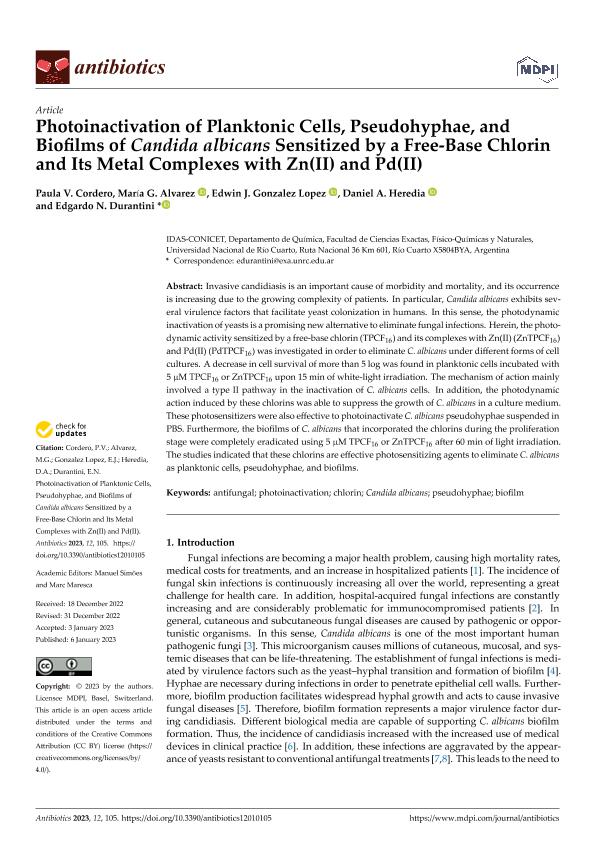Artículo
Photoinactivation of Planktonic Cells, Pseudohyphae, and Biofilms of Candida albicans Sensitized by a Free-Base Chlorin and Its Metal Complexes with Zn(II) and Pd(II)
Cordero Gabrielli, Paula Verónica ; Alvarez, María Gabriela
; Alvarez, María Gabriela ; Gonzalez Lopez, Edwin Javier
; Gonzalez Lopez, Edwin Javier ; Heredia, Daniel Alejandro
; Heredia, Daniel Alejandro ; Durantini, Edgardo Néstor
; Durantini, Edgardo Néstor
 ; Alvarez, María Gabriela
; Alvarez, María Gabriela ; Gonzalez Lopez, Edwin Javier
; Gonzalez Lopez, Edwin Javier ; Heredia, Daniel Alejandro
; Heredia, Daniel Alejandro ; Durantini, Edgardo Néstor
; Durantini, Edgardo Néstor
Fecha de publicación:
01/2023
Editorial:
Multidisciplinary Digital Publishing Institute
Revista:
Antibiotics
ISSN:
2079-6382
Idioma:
Inglés
Tipo de recurso:
Artículo publicado
Clasificación temática:
Resumen
Invasive candidiasis is an important cause of morbidity and mortality, and its occurrence is increasing due to the growing complexity of patients. In particular, Candida albicans exhibits several virulence factors that facilitate yeast colonization in humans. In this sense, the photodynamic inactivation of yeasts is a promising new alternative to eliminate fungal infections. Herein, the photodynamic activity sensitized by a free-base chlorin (TPCF16) and its complexes with Zn(II) (ZnTPCF16) and Pd(II) (PdTPCF16) was investigated in order to eliminate C. albicans under different forms of cell cultures. A decrease in cell survival of more than 5 log was found in planktonic cells incubated with 5 μM TPCF16 or ZnTPCF16 upon 15 min of white-light irradiation. The mechanism of action mainly involved a type II pathway in the inactivation of C. albicans cells. In addition, the photodynamic action induced by these chlorins was able to suppress the growth of C. albicans in a culture medium. These photosensitizers were also effective to photoinactivate C. albicans pseudohyphae suspended in PBS. Furthermore, the biofilms of C. albicans that incorporated the chlorins during the proliferation stage were completely eradicated using 5 μM TPCF16 or ZnTPCF16 after 60 min of light irradiation. The studies indicated that these chlorins are effective photosensitizing agents to eliminate C. albicans as planktonic cells, pseudohyphae, and biofilms.
Palabras clave:
ANTIFUNGAL
,
BIOFILM
,
CANDIDA ALBICANS
,
CHLORIN
,
PHOTOINACTIVATION
,
PSEUDOHYPHAE
Archivos asociados
Licencia
Identificadores
Colecciones
Articulos (IDAS)
Articulos de INSTITUTO PARA EL DESARROLLO AGROINDUSTRIAL Y DE LA SALUD
Articulos de INSTITUTO PARA EL DESARROLLO AGROINDUSTRIAL Y DE LA SALUD
Citación
Cordero Gabrielli, Paula Verónica; Alvarez, María Gabriela; Gonzalez Lopez, Edwin Javier; Heredia, Daniel Alejandro; Durantini, Edgardo Néstor; Photoinactivation of Planktonic Cells, Pseudohyphae, and Biofilms of Candida albicans Sensitized by a Free-Base Chlorin and Its Metal Complexes with Zn(II) and Pd(II); Multidisciplinary Digital Publishing Institute; Antibiotics; 12; 1; 1-2023; 1-19
Compartir
Altmétricas



